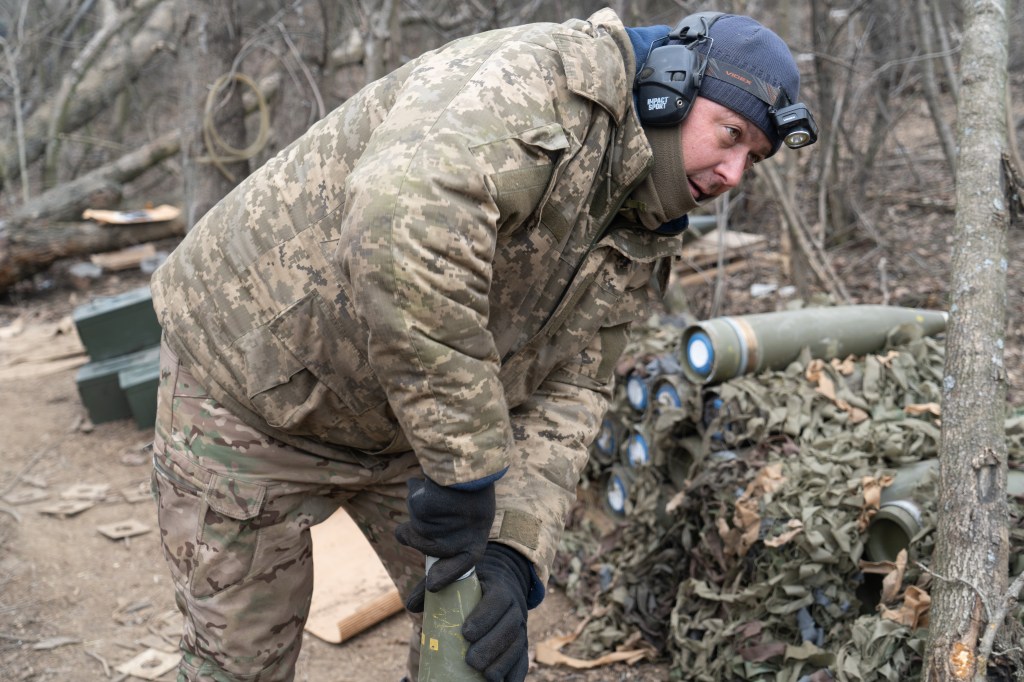Hello and happy Sunday. This weekend marked the second anniversary of Russia’s invasion of Ukraine. The pre-dawn attacks on Kyiv, Kharkiv, Odesa, Kramatorsk, Dnipro, and the Hostomel airport hit at about 10 p.m. ET or so, and I remember having trouble sleeping, fearing for the innocent Ukrainians who seemed likely to be under Russian control within days.
Two years ago, I was worried about the fate of one country. Today, I’m still worried about Ukraine. But while the Ukranians have paid a devastating price for Russia’s aggression, the war has taken its toll here, too, exposing a not-insignificant portion of the right’s isolationism at best, and pro-Russian sympathies at worst. The erosion of support for the Ukrainian cause is just one symptom of a larger problem we face, but it’s painfully illustrative. A friendly nation that we promised to protect in 1994 is facing an existential threat from a murderous dictator, a majority of Americans view the war as important to U.S. interests, and backing Kyiv upholds American ideals of democracy and freedom. And yet, our Congress is so dysfunctional that one faction of one party has gummed up the works.
Think back to the early days of the war. The Russians had underestimated the resolve of the Ukrainians and the competence of their president, Volodymyr Zelensky. And Moscow was overconfident about its own capabilities, too: They never took the airport or gained air superiority, and their trucks and tanks got bogged down in the mud. I remember sitting down with our kids and showing them Red Dawn—the good, original one with Patrick Swayze—and then just days later seeing photos of damaged and abandoned Russian tanks with “Wolverines” spray-painted on the sides. There is nothing joyful about war, but admit it—we were all a little giddy when we saw Ukrainian farmers towing tanks behind their tractors. (They even made a stamp!)
Contrast that with the sentiments we see today. Bennett Murray, a freelance journalist who’s based in Belgrade and has written a few pieces for us (and joined us on Dispatch Live yesterday), spent some time on the front lines recently and wrote about what he saw. The soldiers he talked to were loyal and committed, but frustrated. Pessimism abounded:
“I don’t know why people think in America that their lives will become better if they stop aiding Ukraine,” said Zhenya, estimating that the typical American taxpayer would probably contribute roughly the equivalent of two beers per month to the war effort should aid resume. “But then the reasons why you drink beer would not be as happy,” he added, speculating what would happen if aid dries up for good. “American soldiers might die in some other wars because of that, because this is like a domino effect.”
But what’s clear to a Ukrainian soldier on the front lines—that there’s a real chance that America could find itself forced into war we don’t want because we’re unwilling to help Ukraine, which is doing all the heavy lifting and taking on all the casualties—is lost on a good number right-wing pundits and House Republicans, as well as a smaller—but vocal—contingent of Senate Republicans.
There is plenty of room to debate how much aid we should be providing, and what form it should take. (And it’s worth considering whether Ukraine could have been more successful more quickly if the Biden administration hadn’t dragged its feet on supplying some weapons out of fear of escalation.) But once upon a time, America did the big, hard things. We helped our allies repel Nazi Germany, we helped rebuild Europe and Japan after World War II. We won the Cold War.
This time around, we’re not being asked to do the big, hard thing. Despite what you might hear from Tucker Carlson or Elon Musk, Ukrainians aren’t asking us to sacrifice our sons and daughters and loved ones. They just want our weapons—and, as we’ve noted here at The Dispatch, the United States is using the money allocated to Ukraine to restore our own stockpiles with new and better weapons while they take on our gently used Humvees and Bradleys.
And we’re not taking sides in a conflict between two countries of little strategic importance. Ukraine’s opponent isn’t some Third World banana republic. It’s Russia. I grew up during the Cold War. We didn’t actually do duck-and-cover drills in school like some places did, but I occasionally gazed skyward and wondered what it would be like to know a nuclear weapon was headed our way. We cheered when President Ronald Reagan went to Berlin and said, “Mr. Gorbachev, tear down this wall.” And we cheered again when the Germans, who’d gotten a little tired of waiting, did it for him.
And now we have Republicans and conservatives who aren’t merely shrugging their shoulders at Russian aggression, but carrying water for Vladimir Putin. Most recently, Tucker Carlson traveled to Moscow for a sitdown with Putin during which he largely let the Russian president spew propaganda for two hours (see more below). A bipartisan group of senators spent months crafting a bill that would have provided border security funding as well as support for Ukraine, Israel, and Taiwan—a key demand of House Republicans—and then Speaker Mike Johnson called that bill “dead on arrival” before the text of the bill was even released. Now, Johnson is sitting on a bill that passed the Senate and would allocate $95 billion for Ukraine and Israel.
It’s frustrating. I’m not sure there’s a better—or at least more diplomatic—way to put it. It’s bad enough when our polarization and fraught politics cause problems here in the United States. But when our problems affect our allies, who are fighting for their own survival against a shared enemy, it feels a lot worse.
We’ll continue our coverage of the war in the coming weeks. Thanks for reading.
I don’t know whether you are old enough to remember two particular incidents from the late 1980s that are best described as an intersection of retail and politics. But while I did not have “Flashbacks to Boris Yeltsin and George H.W. Bush grocery shopping” on my 2024 bingo card, here we are. Tucker Carlson’s recent trip to a Russian supermarket reminded me of both those forays, in different ways. Back in 1989, Yeltsin made an impromptu visit to a Houston-area supermarket and was so stunned by the abundance—and so enamored with frozen pudding pops—that it helped change his mind about communism. A few years later, Bush 41 got slammed as out-of-touch in the press for describing a barcode scanner as “amazing,” though most stories neglected to report that Bush was being shown a new kind of scanner with updated technologies. Anyhow … Tucker did his best impression of both of them, only in some Stranger Things-esque Upside Down where he was disingenuously credulous about the offerings at a Russian supermarket and weirdly amazed by coin-operated shopping carts. Scott offered some thoughts in this week’s edition of Capitolism (🔒), where he invoked another relic of the 1980s—Phil Hartman’s Unfrozen Caveman Lawyer character from Saturday Night Live. “Carlson misunderstands Western grocery store technology; misunderstands Americans’ comparative food abundance (in historical and global terms); misunderstands exchange rates; and misunderstands what groceries actually cost out here in Real America, even at the places he hates,” he writes. “His unfrozen caveman-like amazement and commentary are modern American populism—heavy on ‘elite’ condemnation, comically light on substance, and dripping with ulterior motives—at its finest.”
Conservatives who’ve spent time in the media industry—or reading and watching what the media puts out—accept as a truism that mainstream media outlets have a liberal bias. (I could document numerous examples, but I don’t want to keep you all day.) “It’s no exaggeration to say that rebutting the worldview of outlets like the New York Times is why right-wing infotainment exists to begin with,” Nick wrote in Thursday’s Boiling Frogs (🔒). So it’s been kind of amusing to watch liberals grow outraged with mainstream coverage of Joe Biden’s run for reelection, the Hur report, and general concerns about his age. Nick is sympathetic, but only to a point. “I think the left’s Big Cope is a backlash to the fact that they really, truly might lose an election to Donald Trump. It’s unthinkable. … I share their exasperation,” he writes. “It’s much nicer to think that the media could end up costing Biden the election than to face the unbearable fact that American decadence has reached such a point of civic corruption that half the electorate is okay with rolling the dice on Trump again. It really is a Big Cope.” Kevin, for his part, was a little less sympathetic in Wanderland (🔒): “Biden’s age and his mental fitness for the office are a problem not because the New York Times and its ‘corporate’ associates have issued a command but because Joe Biden currently is the president of the United States of America and, as such, is frequently in view of the public, which can plainly see that he is a diminished man who is rapidly declining from what was—let’s face it—not exactly an Olympian height of intellect to begin with.”
And here’s the best of the rest.
- The Senate map in the 2024 election does not favor Democrats: Joe Manchin isn’t seeking reelection, they have to fend off challenges in the red states of Ohio and Montana, and a few swing states are up for grabs. John took a look at how things might shake out.
- Chris Stirewalt marked George Washington’s birthday this week by arguing the best thing our first president might have done was to willingly step aside after two terms. Chris’ piece also lauded LBJ and Richard Nixon for putting the country ahead of their own ambitions nearly a half-century ago. Now if only a few other people—hint, hint—would listen.
- Not all the criminal cases against Donald Trump are equally damning. And, as Sarah and Michael note in this week’s Collision: “Even the strongest of the criminal cases against Trump is starting to look a little shaky. … Trump’s defense has always been that the [classified] documents belonged to him and that he was allowed to keep them. … But as special counsel Robert Hur laid out in his report on Joe Biden’s retention of classified material, Biden himself made a nearly identical argument.”
- The Biden administration is cooking up a proposal to keep Hezbollah and Israel from engaging in a full-scale war, and Richard Goldberg is unimpressed. “No one should be confused by an election year ploy to buy a few months of quiet on Israel’s northern border,” he writes. “A major war is coming—it’s only a question of when.”
- And, the podcasts: Sarah and David had a very illuminating conversation on Advisory Opinions about the Alabama Supreme Court’s ruling on fertilized embryos and the possible fallout for the future of IVF treatment. On the Dispatch Podcast, Jamie interviewed Rep. Dan Crenshaw, who claimed he’s not that worried about a potential Trump second term. And Jonah welcomed CNN’s Jake Tapper to The Remnant to discuss Tapper’s new show, United States of Scandal.








Please note that we at The Dispatch hold ourselves, our work, and our commenters to a higher standard than other places on the internet. We welcome comments that foster genuine debate or discussion—including comments critical of us or our work—but responses that include ad hominem attacks on fellow Dispatch members or are intended to stoke fear and anger may be moderated.
You are currently using a limited time guest pass and do not have access to commenting. Consider subscribing to join the conversation.
With your membership, you only have the ability to comment on The Morning Dispatch articles. Consider upgrading to join the conversation everywhere.